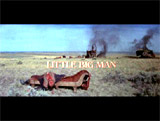
|
Little Big Man (1970)
In Arthur Penn's revisionist, Forrest Gump-like
serio-comic western epic based upon Thomas Berger's best-selling
novel, a fancifully-told flashback tale:
- the opening scene, introducing the character of
121 year-old Jack Crabb (Dustin Hoffman with Terry Miles' incredible
makeup) - the only white survivor of Custer's Last Stand in 1876
at Little Big Horn, who recalled his tall-tale epic exploits in
the West to a skeptical historian-interviewer (William Hickey)
- about how he was raised by the Cheyenne Indians (who called themselves
"Human Beings") and wise tribal chief Old Lodge Skins (Oscar-nominated
Chief Dan George), and eventually acquired the nickname "Little
Big Man": ("I am, beyond a doubt, the last of the old-timers.
My name is Jack Crabb. And I am the sole white survivor of the Battle
of Little Big Horn, uh, uh, popularly known as Custer's Last Stand...")
- the moving speech of Old Lodge Skins to Little Big
Man/Jack Crabb, as he held up a white man's scalp, about the difference
in beliefs between the White Man and the "Human Beings" (their
Indian tribe), after being asked if he hated the White Man: ("Do
you see this fine thing? Do you admire the humanity of it? Because
the Human Beings, my son, they believe everything is alive. Not only
man and animals, but also water, earth, stone. And also the things
from them like that hair. The man from whom this hair came, he's
bald on the other side, because I now own his scalp! That is the
way things are. But the white man, they believe everything is dead.
Stone, earth, animals, and people! Even their own people! If things
keep trying to live, white man will rub them out. That is the difference")

|
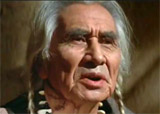
|
|
Old Lodge Skins with Scalp
|
- the scene in 1865 when 16 year-old Jack was assaulted
by a US cavalry trooper and almost killed, but convinced the murderous
soldier that he was 'white' in order to be saved: ("Shooting
rifles against bow and arrow. I never could understand how the
white world could be so proud of winning with them kind of odds.
'God bless George Washington!' Before I knowed it, them words just
popped out of my mouth. 'God bless my mother!' You murderin' fool!
Got to cut your throat to get it through your head I'm a white
man...Sure I'm white. Didn't you hear me say: 'God bless George
Washington'? 'God bless my mother'? I mean, now, what kind of Indian
would say a fool thing like that?")
- and later as a teenager, Jack's raising by puritanical
Reverend Silas Pendrake (Thayer David), taken in for "moral
guidance and a Christian upbringing"
although he was immediately seduced by Pendrake's sex-obsessed young
wife Louise (Faye Dunaway), who gave young Jack a bath while singing
the gospel song: "Shall We Gather at the River" and delivering "religious
instruction"; he recalled it as the "greatest bath I ever
had in my life": ("Poor boy. He hasn't even had a proper
bath. His darling neck is so... I detect the odor of food. I shall
wash this poor, dirty boy...Silas, it is my Christian duty to give
this boy an immediate thorough bath. Take off your clothes, dear...E-
Every stitch. But I shall avert my eyes at the necessary moment...");
as she stroked his leg and excited him, she simultaneously asked: ("Are
you thinking of Jesus, Jack?"); and after the bath was completed,
she personally toweled him dry: ("All right now, dear, please
stand up and let me dry you off. I shall avert my eyes, of course.
Fine, now step out of the tub - and - actually, you are rather well
grown, Jack. You're small but nice-looking. Did you know that?...The
girls, I'm sure, will all be after you. And Jack...That way lies madness...You,
you'll understand these things better when you're older. The point
is, my dear boy, that we all must resist temptation. Purity is its
own reward. Dear Jack, (she kissed him) welcome to your new home")
Jack's Bath Delivered by Sex-Obsessed Louise
"Are you thinking of Jesus, Jack?"
|

|

|

|
- the scenes of Jack's days as a gunfighter (the "Soda
Pop" Kid) when he met Wild Bill Hickok (Jeff Corey) in a saloon
- the hilarious scene in a teepee when Jack was encouraged
to sleep with the three widowed sisters of his wife Sunshine (Aimée
Eccles), while she was giving birth; the sisters (Digging Bear, Little
Elk, and Corn Woman) each took turns having sex with Jack inside
the teepee; during the first instance as he climbed under a blanket,
Jack mused:
"Well, I guess you'll do as well as any. I figured she was the
littlest one, and it would be easy. But Lord help us, them young girls
is deadly. However, the Great Spirit was with me and I survived";
afterwards, Sunshine praised the exhausted Jack: "I knew you were
a good man"
- the recreation of insane Gen. George Armstrong Custer's
(Richard Mulligan) 1868 mid-winter surprise attack and brutal massacre
of Black Kettle's Cheyenne encampment (of mostly women and children)
on Indian lands at Washita River (shot silently through a telephoto
lens) with the additional slaughter of Indian horses and views of
bodies lying in the snow, in the midst of which Custer made insensitive
comments: ("You think it's shocking to shoot a few ponies? Well,
let me tell you, the women are far more important than the ponies.
The point is, they breed like rats, however, Lieutenant, this is
a legal action. And the men are under strict orders not to shoot
the women. Unless, of course, they refuse to surrender")
- the scene of Custer's "mule-skinner" scout
Jack, using reverse psychology, tricking General Custer into leading
his cavalry troops to the disastrous Little Big Horn - where they
were massacred: ("General, you go down there... There are thousands
of Indians down there. And when they get done with you, there won't
be nothin' left but a greasy spot. This ain't the Washita River,
General. And them ain't helpless women and children waitin' for ya.
They're Cheyenne brave and Sioux. You go down there if you got the
nerve"); Custer thought he had outsmarted Jack and vowed to
proceed: ("Still trying to outsmart me, aren't you, mule skinner?
You want me to think that you don't want me to go down there,
but the subtle truth is, you really don't want me to go down
there. Well, are you reassured now, Major? Men of the seventh! The
hour of victory is at hand! Onward to Little Big Horn and glory!")
- toward the end of the film, Chief Old Lodge Skins'
decision to die, accompanied by Jack to the Indian burial ground,
where he made a speech about his gratitude before lying down to die:
("It makes my heart sad. A world without Human Beings has no
center to it....It is a good day to die! Thank you for making me
a Human Being! Thank you for helping me to become a warrior. Thank
you for my victories and for my defeats. Thank you for my vision
and the blindness in which I saw further. You make all things and
direct them in their ways, oh Grandfather. And now, you have to silence
the Human Beings! We'll soon walk a road that leads nowhere. I am
going to die now, unless death wants to fight. And I ask you for
the last time to grant me my old power to make things happen. Take
care of my son, here. See that he doesn't go crazy."); but then
when it started to rain, the Chief remarked as he sat up: ("Am
I still in this world?...Well, sometimes the magic works, sometimes
it doesn't")
|

121 Year-Old Jack Crabb

Jack Crabb: aka "Little Big Man"

"I'm a white man!"

The "Soda Pop" Kid with Wild Bill Hickok

Jack Sleeping with the Three Widowed Sisters of His Wife


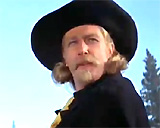
Gen. Custer's Washita River Massacre
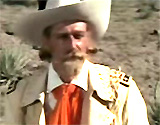
Custer: "Onward to Little Big Horn"

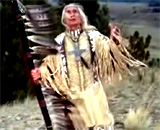
Chief Old Lodge Skins' Dying Speech
|












